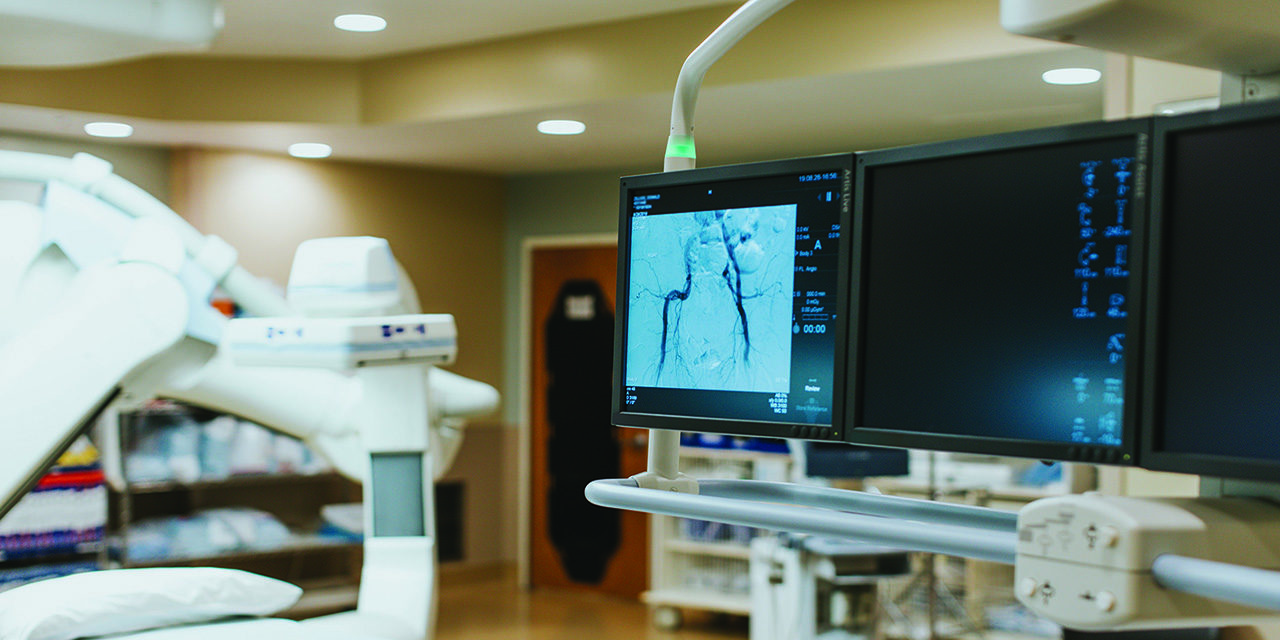Carotid artery disease is one of the many risk factors that can lead to stroke – though it’s not necessarily the most common one.
“That being said, risk prevention is a lot easier than treating a stroke,” says Roger Walcott, MD, FACS. Dr. Walcott is an accomplished vascular and endovascular surgeon, with special interests in aortic and aneurysm repair.
When carotid artery disease is diagnosed properly [and early on!], it can be effectively treated by a vascular specialist like Dr. Walcott.
“It’s important to have many aspects of your health evaluated for risk of causing a stroke, and having screenings where appropriate,” he says. This should be in addition to lifestyle modifications, which can even be effective for individuals who are predisposed in some way.
Why Are My Carotid Arteries So Important?
“Carotid arteries are the main vessels that transport blood to the front of the brain,” says Dr. Walcott. “The front of the brain controls movement of our arms, legs, and face.”
This explains why strokes can be spotted by drooping of one side of the face, or the inability to lift one of your arms. If that blood flow from the carotid arteries is blocked for any reason, it affects those skills.

Roger Walcott, MD, FACS
Vascular & Endovascular Surgeon
What is carotid artery disease?
Carotid artery disease refers to when the blood flow in an individual’s carotid arteries has become compromised. This is often due to buildups of cholesterol plaque that may “block” blood flowing through these vessels (your doctor will call this atherosclerosis). It can also be called carotid artery stenosis, which means narrowing of the blood vessels.
How do you know if you have carotid artery disease?
Carotid artery disease often doesn’t present symptoms until it causes a stroke or transient ischemic attack (“mini stroke”).
The good news? ‘”If diagnosed early, carotid artery disease may be able to be treated with medication,” Dr. Walcott says.
Regular visits with your primary care physician allow your doctor to determine if you possess any risk factors, based on your family history and overall health. Doctors can use their stethoscopes to listen for blood flow in your carotid arteries. If a problem is suspected, you will be referred for further vascular screening.
How does a vascular surgeon determine treatment for carotid artery disease?
Whether medication therapy will be effective for an individual or if a procedure will be required may depend on a number of “technical factors,” specifically:
- Where the artery is
- Where stenosis (narrowing) is
- Type of plaque causing the buildup
Medication therapy
If diagnosed early, carotid artery disease can be effectively treated with an antiplatelet medication or cholesterol-lowering statins.
Stenting
Placing a stent in the narrowed artery reinforces the arterial wall, making sure the passage stays open to promote optimum blood flow.
Endarterectomy
One of the most common vascular procedures, performed to remove plaque buildup and blockages.
Transcarotid artery revascularization (TCAR)
A low-risk procedure that gives vascular surgeons a minimally-invasive way to place a stent. During the procedure, a filtering system is used to reroute blood flow, resulting in better outcomes for the patient.
The Bottom Line
Dr. Walcott’s recommendations for long-term artery health:
- A history of smoking puts you at risk for carotid artery disease, in addition to stroke and heart disease. If you’re currently smoking or vaping, seek out resources to help you quit.
- Emphasize prevention when it comes to your overall health and wellness. The easiest way to do this is to schedule consistent visits with your primary care provider.
- Maintain your health on a daily basis, which includes regular exercise and a diet that incorporates plenty of fruits and vegetables. Even as new dietary research emerges, we come to the same conclusion over and over: Plants are great for your health.
Reminder: Strokes are a medical emergency. If you or someone nearby is experiencing symptoms of a stroke or neurologic event, call 911 immediately.





